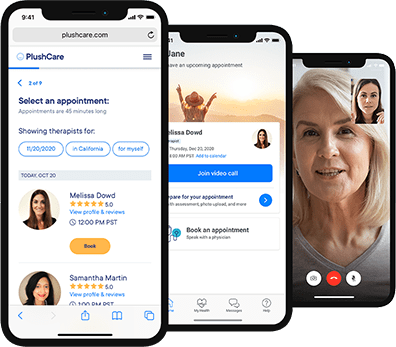*NOTE: Due to a lack of scientific data at this time, PlushCare physicians do not prescribe ivermectin, hydroxychloroquine, or azithromycin/other antibiotics to treat COVID-19.
Dealing With COVID-19 Depression
Have you been struggling with feelings of helplessness, hopelessness, irritability, agitation, or worthlessness? Are you eating or sleeping more or less than usual? Have you lost interest in things you used to enjoy?
Whether you’ve been struggling with these feelings since the beginning of the COVID-19 pandemic, or if your problems started after you were sick with COVID-19, you may be dealing with COVID-19 depression - and you’re not alone. In January 2021, 41.1% of adults reported symptoms of depression, anxiety, or both compared to 11% of adults in 2019.
Help for you may be only a click away. Let’s take a look at COVID-19 depression and how you can start to feel better about life.

1
Browse our network of top therapist to find one that matches your needs.
2
Get private and secure emotional support weekly from your dedicated therapist.
3
Experience comprehensive care with unlimited access to your care team and primary care physician.
What Are the Mental Health Effects of COVID-19?
Mental health status during COVID-19 has been negatively impacted for many people around the world. In fact, nearly four times as many people reported symptoms of anxiety or depression in January 2021 than reported in January through June 2019.
There are many logical reasons for this. On the one hand, measures to help slow the spread of COVID-19, such as social distancing, closing or restricting business operations, and distance learning have set up a perfect storm of circumstances that can affect a person’s mental health.
On the other hand, COVID-19 may actually invade the brain, and such an infection can increase the risk of developing a psychiatric disorder, insomnia, or dementia. In fact, one study showed that one-third of patients can develop neurologic problems.
Whether your symptoms are caused by the infection, the pandemic as a whole, the loss of a loved one due to COVID-19, or something else entirely, you aren’t alone in your struggles. Let’s take a closer look at some COVID-19 mental health statistics.
COVID-19 Mental Health Statistics
The COVID-19 depression rate is different among various groups of people. For example, young adults are significantly more likely to report symptoms of depression or anxiety than those over 65, and people in lower income brackets are more likely to say that worry or stress related to COVID-19 has had a major negative impact on their mental health.
Here are a few interesting COVID-19 mental health statistics:
56.2% of young adults (18-24 years old) report symptoms of anxiety or depression compared to 29.3% of adults over the age of 65 years.
53.4% of adults in households that have suffered a job loss due to COVID-19 reported symptoms compared to 31.8% of adults in households without job loss.
56% of adults in households that earn less than $40k per year report a negative impact on their mental health status compared to 48% of adults in households that earn more than $90k per year.
48% of non-Hispanic Black adults reported symptoms compared to 46.3% of Hispanic or Latino adults, 40.9% of non-Hispanic White adults, and 33.1% of non-Hispanic Asian adults.
42% of essential workers reported symptoms of depression or anxiety compared to 30% of nonessential workers.
COVID-19 Depression Symptoms
If you have been experiencing depression during COVID, you may have symptoms such as:
Feelings of hopelessness, helplessness, emptiness, tearfulness, or sadness
Sleeping too much or too little
Loss of interest or pleasure in most activities, including sex, sports, or hobbies
Frustration, irritability, or angry outbursts
Tiredness and lack of energy, so even small tasks feel difficult
Agitation, anxiety, or restlessness
Unexplained pain
Feelings of guilt or worthlessness
Difficulty concentrating, thinking, remembering things, and making decisions
Slowed speaking, thinking, or body movements
Eating more or less than usual
Frequent or recurrent thoughts about death or suicide or suicide attempts
Related: Chronic Insomnia: Symptoms, Causes, and Treatment
COVID-19 Depression Causes
Many different things can cause or contribute to COVID depression. A few causes include:
Job loss
Financial worries
Social isolation and loneliness
Uncertainty about the future
Disruption of regular routines
Loss of loved ones
Fear of getting COVID-19
Brain changes as a result of having had a COVID-19 infection
Long-term health challenges due to COVID-19 infection
Other things that can cause depression that aren’t necessarily related to COVID-19 include:
Brain chemistry
Biological differences
Family history
Hormones
How to Cope With COVID-19 Depression
Wondering how to deal with COVID-19 depression in a healthy way? Here are some tips:
Take care of yourself. Eat right and exercise.
Maintain a routine. Even if you aren’t working, treat weekdays like workdays.
Limit how much time you spend watching the news, especially news related to COVID-19.
Stay connected with friends and family through social media, Skype, Zoom, or even regular phone calls or texts.
Make time to do things you enjoy.
Get mental health therapy. Therapy is more than just talking about your problems. It gives you tools for managing and improving your symptoms of depression.
Talk to a doctor about medication. While not everybody needs medication to get over a bout of depression, it can make a world of difference for some people.

1
Browse our network of top therapist to find one that matches your needs.
2
Get private and secure emotional support weekly from your dedicated therapist.
3
Experience comprehensive care with unlimited access to your care team and primary care physician.
Online Therapy for COVID-19 Depression
If you’ve been struggling with depression as a result of COVID-19, online therapy with a licensed PlushCare therapist can help. After booking a video appointment with one of our trusted therapists, you can work through your depression or other challenges you may be struggling with.
Want to talk to a doctor about mental health medication for your COVID-19 depression? Book an appointment with one of our licensed doctors.
Read More About COVID-19 Depression
Sources:
PlushCare is dedicated to providing you with accurate and trustworthy health information.
Harvard Health Publishing. Could COVID-19 infection be responsible for your depressed mood or anxiety? Accessed on April 29, 2021 at https://www.health.harvard.edu/blog/could-covid-19-infection-be-responsible-for-your-depressed-mood-or-anxiety-2021041922391
Kaiser Family Foundation. The Implications of COVID-19 for Mental Health and Substance Use. Accessed on April 29, 2021 at https://www.kff.org/coronavirus-covid-19/issue-brief/the-implications-of-covid-19-for-mental-health-and-substance-use/
Mao L, Jin H, Wang M, et al. Neurologic Manifestations of Hospitalized Patients With Coronavirus Disease 2019 in Wuhan, China. JAMA Neurol. 2020;77(6):683–690. https://jamanetwork.com/journals/jamaneurology/fullarticle/2764549
Mayo Clinic. Depression (Major Depressive Disorder). Accessed on April 29, 2021 at https://www.mayoclinic.org/diseases-conditions/depression/symptoms-causes/syc-20356007
Stanford Medicine. COVID-19 Q&A: Dr. Elizabeth Reichert on Depression, Anxiety, Risk for Suicide. Accessed on April 29, 2021 at https://med.stanford.edu/psychiatry/about/covid19/anx.html



